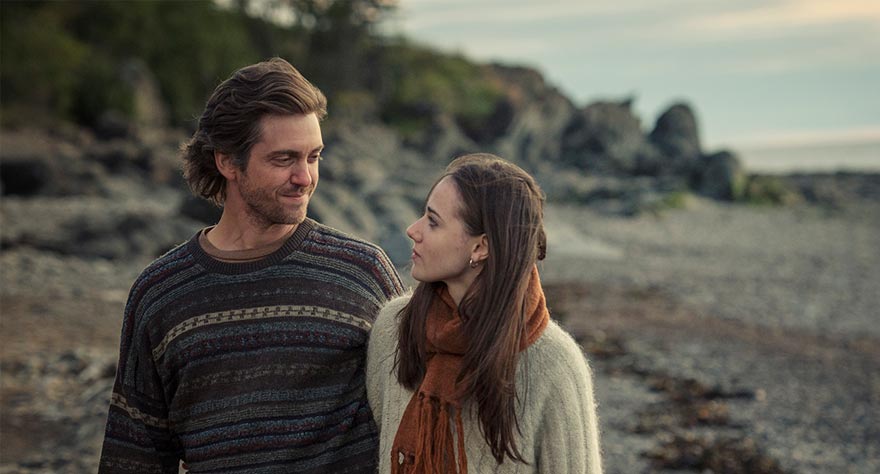
This tender, decades-spanning film about one man's life and family takes an unstructured observational approach to wonderful heights.

This tender, decades-spanning film about one man's life and family takes an unstructured observational approach to wonderful heights.
I recently had the great privilege to program a small film festival at my local theater. The theme I chose was “Directed By Women,” in an effort to celebrate and spotlight women directors. I tried to make the offering of films as varied as possible, presenting everything from Oscar-winning fare to indie documentaries—and films both foreign and domestic. The directors whose films I chose ranged from Ida Lupino (The Hitch-Hiker) to Kathryn Bigelow (The Hurt Locker). If only I had seen Our Loved Ones before then, I would have begged to include Anne Émond’s film on the roster.
The story begins with the death of a family’s patriarch. Of the decedent’s five children, two are sons. The elder son, André (Mickaël Gouin), who discovers his father’s body, lies to his younger, more sensitive brother David (Maxim Gaudette), as well as other family members who were not present, about the circumstances surrounding their father’s death. There is no malfeasance behind the false explanation, only a desire to shield the younger son and others from the painful truth.
As years and decades pass, David grows up, grows older, and comes into his own. He has both professional and artistic success as a maker of marionettes, he is able to employ André (at their mother’s behest—but still), and he has two beautiful children of his own. That said, and setting aside these successes, David still lives with the specter of his father’s passing, and his relationship with his teen daughter Laurence (Karelle Tremblay) presents challenges he doesn’t expect.
Our Loved Ones (Les êtres chers) is only the second feature from writer/director Anne Émond, but what she puts onscreen shows such tremendous confidence—the film feels like it has come from someone with 10 times her experience.
It starts with the film’s narrative (or the lack thereof). Our Loved Ones doesn’t tell a story so much as it observes one man’s life; that man is David. It hits the two key points in his life it needs to hit (and early) to get the observation going: his father’s death and his introduction to the woman in his life, Marie (Valérie Cadieux). From there, Émond takes something of a highlight reel-approach to her film, skipping huge chunks of David’s life and presenting moments along his timeline. These moments, however, are not typical highlight reel fare. They aren’t the kind of “this is your life” moments many have come to expect from films. They are, however, meaningful later in the film.
This is the real magic of the screenplay. The film has a definitive beginning and, more importantly, a definitive end. But the middle, despite being critical to the conclusion, isn’t driving the film to the end. Émond selects moments that are key to the life she wants us to observe, not the life’s moments we think we should see.
More of that confidence shines in the way Émond presents David’s life, as it demands a lot from the viewer in terms of intelligence and faith. This 102-minute tale spans decades (which is so ambitious for most veteran filmmakers, let a lone a sophomore). As such, Émond must make great leaps forward in time, but when she does, those leaps aren’t announced. There is no subtitle or title card presenting the year in which the new action is taking place; it simply happens. For example, there is a scene early where David and Marie have just met, and they are carefully walking on a frozen lake at night. Cut to the next scene, and not only is it warm and sunny, David and Marie are living together. Cut to the scene after that, and they are at his mother’s house with their baby.
It’s jarring at first because it’s an approach that belies the usual spoon-feeding most movies offer viewers and instead requires the viewer to pay close attention for things in the film that indicate where it is along David’s timeline. This jumping—sometimes far, sometimes not—to points in David’s life that aren’t the usual key moments in a person’s life also requires faith from the viewer that Émond has planned on the whole being greater than the sum of its parts. It is.
Despite this praise (which is wholly earned), Émond’s confidence is a little higher than her storytelling skill. There is an event early in the film that aches to be addressed and never is. There is a shocking moment late in the film that comes as some considerable surprise—a moment that is key to the film’s end—but it feels contrived, like Émond wasn’t sure which points to insert into David’s timeline to support this particular moment and instead decided the viewer would simply make some necessary connections to earlier, tangentially related moments. In a film that demands a lot, this is asking for a little too much. Kudos to Émond for not wavering on her approach, but that kind of resolve comes with a price.
Still, this film is mesmerizing in the story it tells and the way it tells it, with a wonderfully soulful performance from acting veteran Gaudette as David, as well as a captivating turn from relative newcomer Tremblay as Laurence. There is great father/daughter chemistry between the two, which is also key to the film’s success. With Our Loved Ones, Anne Émond boldly makes the movie she wants to make, not the movie she thinks the audience is expecting.